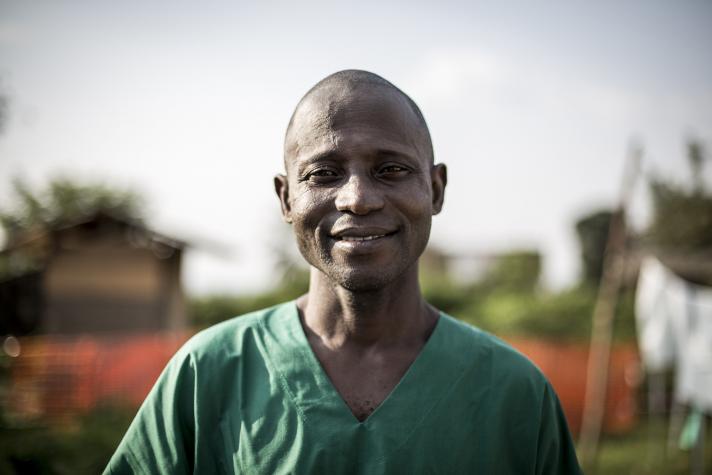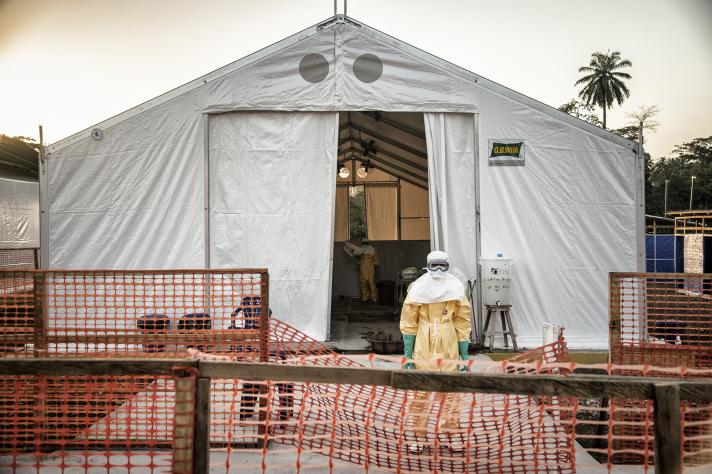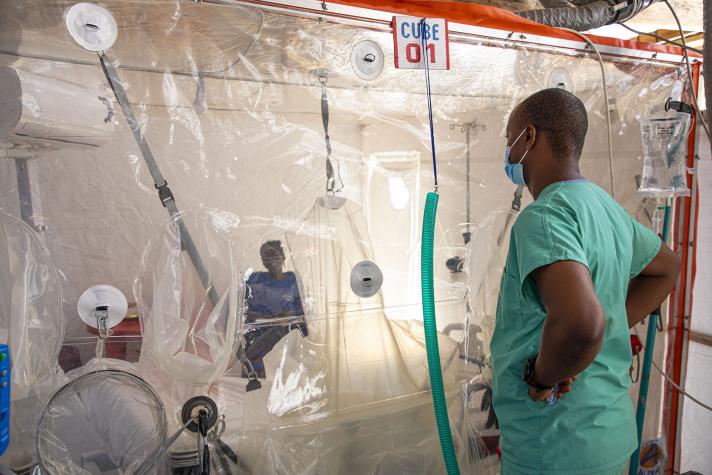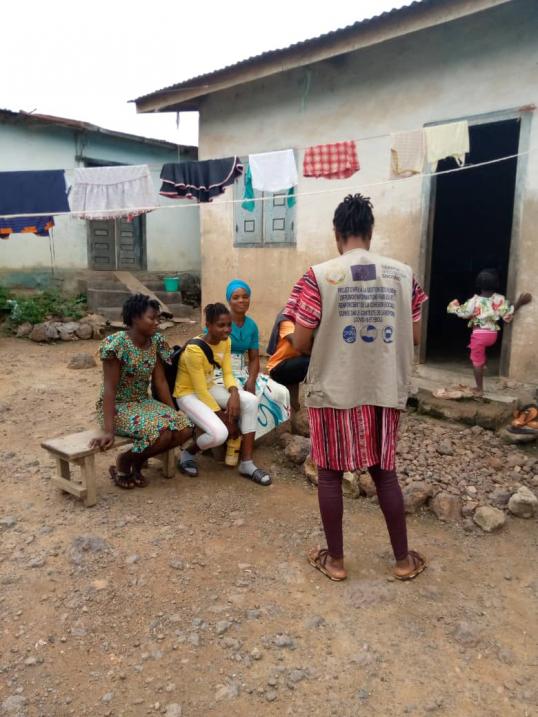Discovered in 1976 in the Democratic Republic of Congo, the Ebola virus disease is today well known to Guinea, further West on the African continent. In 2014, the largest Ebola outbreak in the country claimed over 11,000 lives. “We faced a total psychosis,” said Dr Camara, who works in the field since the epidemic started.
In February this year, Guinea identified 3 new cases. But it was different this time. National authorities implemented quick measures, while the EU and partners rapidly mobilised resources to contain the disease. Patients received life-saving medical equipment and new technology such as the “CUBE”, an innovative treatment facility, was used.
In December 2013, Ebola claimed its first victims in the southeast of the country before spreading to neighbouring countries, including Sierra Leone and Liberia. This outbreak became the largest Ebola epidemic in history, infecting more than 28,000 people between 2014 and 2016, and claiming more than 11,000 lives.
The latest outbreak of Ebola in Guinea was declared in February 2021, when 3 cases of the disease were identified in Gouécké, a village in N'zérékoré province, in the southeast of the country.
As soon as the virus was confirmed, the EU’s contribution was fundamental in mobilising resources, providing rapid and effective assistance to patients and containing the disease. EU partners with recognised expertise were already operational in N'zérékoré: the medical NGO ALIMA, GIZ, the French and Guinean Red Crosses, and Search for Common Ground.
The EU also rushed the delivery of life-saving medical equipment from France, Germany, and Belgium through the European Union's Civil Protection Mechanism. This helped renovate the Gouécké Epidemic Treatment Centre.
This rapid reaction supported the immediate treatment of confirmed Ebola cases with new and more effective drugs, and the prevention of further transmission through personal protection kits and risk communication activities.
“It was so good to see the big differences in our capacities between the outbreak in 2014 and this one. We have learned to help the patients in a dignified manner. We can now offer effective treatments if they reach the health facility in time, making it no longer a fatal disease,” explained Fernando Fernandez, EU Aid’s regional health expert based in Senegal.
“But even more importantly, we can really assist patients in a safer way for the healthcare workers, using devices like CUBE® –a biosecure emergency room, while ensuring a human face and not just the spacesuit we had to use at the time,” said Fernandez. “Treatment centres do not need to be perceived as places where the sick go to die without the option to see them again”, he added.
Adressing the first symptoms
A virus transmitted by animals to humans, which is then highly contagious between humans, causes the Ebola disease. The disease has a devastating impact on the security, economy and health systems of affected regions.
In contrast to 2014, when the response was slow to take hold, the national health authorities quickly implemented response measures with the support of national and international partners, drawing on expertise gained from the fight against recent epidemics in Guinea and the Democratic Republic of the Congo.
Responders immediately implemented infection prevention and control measures, strengthened epidemiological surveillance, and provided human and material resources for the treatment of patients.
© John Wessels / ALIMA
Alseny Modet Camara is a medical doctor for ALIMA, the medical NGO, at their treatment centre in N'zérékoré.
This is the fourth time he faced an Ebola outbreak, having worked in Guinea during the 2014 outbreak and in the Democratic Republic of the Congo during the 10th and 11th outbreaks in 2018 and 2019.
While he admits that he and his colleagues were "not ready" the first time, the man who lost many friends and colleagues to the disease has gone on to witness dramatic scientific advances in the fight against Ebola.
"In 2014, the science was not well developed in terms of the medical management of Ebola. There was no vaccine, no specific treatment. Treatment centres were like mythical places, where no one wanted to go. Many caregivers fled. We faced a total psychosis", said Dr Camara.
© John Wessels / ALIMA
"Then we had the first clinical trials for experimental treatments and vaccines. Following the trial in the Democratic Republic of Congo, 2 treatments were found to be effective if given early enough after the first symptoms appeared. We use these ones today in Guinea. Thanks to this, we were able to save 8 patients who arrived early enough at the treatment centre in N'zérékoré", Dr Camara explains.
He tells the story of the last patient treated at the centre. "She stayed with us for about 3 weeks. As soon as tests proved the presence of Ebola in her blood, she was placed in a CUBE".
This flexible, transparent-walled room allows caregivers to monitor patients continuously from the non-contaminated exterior, while also checking their vitals safely by using the built-in suit.
The CUBE © John Wessels / ALIMA
"The CUBE is a real improvement in care for us caregivers, but more importantly for the patients", says Dr Camara. "This patient was able to have her husband within a few feet of her every day, from morning to night. They could talk through the transparent wall. Her brothers and sisters also came to see her. Having the support of her family inevitably helped her in her healing process".
Deadly rumors
Because of rumors spreading through communities and social networks, many people do not believe in the resurgence of Ebola in N'zérékoré.
But Etienne Kpoghomou is among the volunteers committed to fighting disinformation. During the first outbreak, he lost relatives because they refused to believe the disease was real. So he decided to get involved, to limit contaminations and facilitate the response.
"I am committed to fighting rumors to help my community by saving lives", he says.
© Search for Common Ground
With a few friends, Etienne set up an acting troupe, Zaly Théatry, to raise awareness through participatory plays, with the help of NGO Search for Common Ground, which trained them so they reach a wider audience.
Etienne and his friends offer dialogue sessions, educational talks, interactive broadcasts, home visits or participatory theatre - always respecting the barrier measures enacted by the health authorities.
On 19 June 2021, the Minister of Health of the Republic of Guinea, Dr. Remi Lamah, announced the end of the Ebola epidemic. 23 people had contracted the disease during the resurgence, of which 11 recovered.
Story by Anne-Gaelle Borg, Delegation of the European Union to Guinea.
Main picture: © John Wessels / ALIMA
Publication date: 14/12/2021





